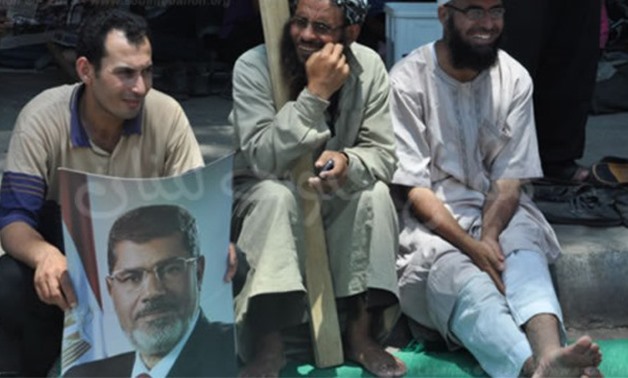
Rabaa Sit-in – File Photo
CAIRO- 5 August 2017: Four years since the removal of the Muslim Brotherhood (MB) from power in Egypt, the outlawed group has not missed opportunities to return to the political arena, even through foreign mediation.
The Muslim Brotherhood group was labeled as a terrorist group in 2013 by interim President Adly Mansour, and all its activities have been banned.
Rachid Ghannouchi, the leader of the Tunisian Islamist Ennahda Party, was one of the latest Islamist figures who tried to re-instate the group through his connections with Turkish President Recep Tayyib Erdogan. Both leaders reportedly seek to incorporate a new term defining Islamic groups, which is “Democratic Islamism”, instead of “Political Islamism.”
In another recent attempt, the head of the Sudanese Nation Party, El-Sadek el-Mahdy, in July called for reconciliation with the MB group. According to his statement published in Sudanese media outlets, Mahdy suggested issuing amnesty for the Brotherhood leaders sentenced to death penalties.
These two initiatives are added to another twelve initiatives of reconciliation suggested following the revolution of June 30, 2013 by several political figures affiliated with the outlawed MB group to bring them back to the political scene.
Hesham Qandil
A few days before the dispersal of the Rabaa protest, the Egyptian prime minister of 2012, Hesham Qandil, urged the state to hold a cooling-off period with the outlawed group through the release of prisoners arrested after June 30, to permit visits to Morsi in his prison cell, to stop media campaigns against the group, and to suspend the freezing of the group’s assets.
Qandil was the first to initiate reconciliation with the Brotherhood, days before his official sacking from office.
Mohamed El-Baradei
The second prominent attempt at reconciliation or a truce was initiated by Egyptian law scholar Mohamed El-Baradei when he requested the state to open dialogue with the Muslim Brotherhood and the Islamist political parties supporting former Islamist President Mohamed Morsi.
This request came before his resignation in 2013 from the post as Egypt’s Vice-President for Foreign Affairs.
Ziyad Bahaa El-Din
In 2013, former Deputy Prime Minister for Economic Affairs Ziyad Bahaa El-Din suggested not excluding the Brotherhood from the political scene, sitting with them to reach points of agreement, and completing the country’s road map with the participation of the MB.
Bahaa El-Din was appointed for this post while Hazem El-Beblawy was heading the cabinet in July 2013 after Morsi’s government was sacked.
Kamal Abuel Magd
Islamist politician Kamal Abuel Magd suggested an initiative in October 2013 that included an agreement with MB leaders to stop violence and demonstrations, as well as abandoning calls for the return of Morsi, in exchange for returning to political life and halting the security pursuit against the group’s members.
Selim Elawa
In 2013, Morsi’s lawyer, Selim Elawa, suggested releasing Morsi and returning him as president, but without any powers, and granting the authority of decisions to an interim government in accordance with Articles 141 and 142 of the Constitution of 2012. He also suggested amending the inactive Constitution of 2012 in line with the road map, followed by a 60-day parliamentary election and a permanent government setting a date for early presidential elections.
Hassan Nafaa
Political Science Professor Hassan Nafaa submitted in 2014 an initiative called “Map for Rescue”, calling for the formation of a scholars committee to be headed by prominent journalist Hussinen Heikal, which would work on reconciliation between both sides. His initiative failed; however, Nafaa then suggested another initiative, named “National Dialogue”, in which he called for the dismissal of the El-Beblawy government, a declaration of renunciation of violence by the state and the MB group, and forming a neutral fact-finding committee to investigate all incidents of violence.
Tarek El-Bashry
Judicial Counselor Tarek El-Beshry called for reconciliation with the MB in his interview with the Anadolu news agency in February 2015.
Ibrahim Yousry
Former Egyptian Ambassador Ibrahim Yousry suggested an initiative for reconciliation with the state that included returning Morsi as the honorary president of the country and granting presidential powers to an interim government.
Mohamed Al-Omda
Former parliamentarian Mohamed Al-Omda had initiated reconciliation between the state and the MB group through lifting the ban imposed on the group, considering the time of Abdel Fatah al-Sisi’s rule as a transitional phase, amending the Constitution, and abolishing the protest law.
Abdel Moneim Aboul Fotouh
Former presidential candidate Abdel Moneim Aboul Fotouh’s initiative included the formation of a government of competent figures, appointing a new prime minister, delegating powers of the president to the prime minister, releasing Morsi , and starting a national dialogue with the state.
Emad Abdel Ghaffour
Head of the Watan Party Emad Abdel Ghaffour called for a new reconciliation, under the name of “National Reconciliation”, to make some concessions and retreats, suggesting resorting to regional forces to monitor the commitment of each party.
Saad El-Din Ibrahim
Director of the Ibn Khaldun Center for Development Studies Saad El-Din Ibrahim presented an initiative for reconciliation between the state and the Muslim Brotherhood in March 2016, which included the release of all Brotherhood leaders and allowing their return to public service.

Comments
Leave a Comment